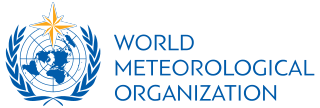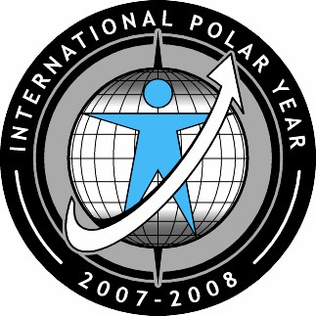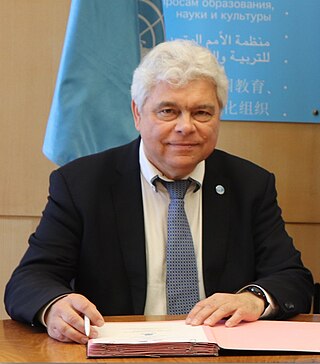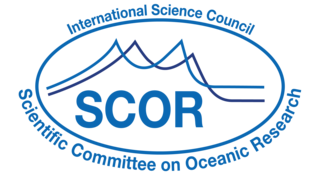
The World Meteorological Organization (WMO) is a specialized agency of the United Nations responsible for promoting international cooperation on atmospheric science, climatology, hydrology and geophysics.

The International Polar Years (IPY) are collaborative, international efforts with intensive research focus on the polar regions. Karl Weyprecht, an Austro-Hungarian naval officer, motivated the endeavor in 1875, but died before it first occurred in 1882–1883. Fifty years later (1932–1933) a second IPY took place. The International Geophysical Year was inspired by the IPY and was organized 75 years after the first IPY (1957–58). The fourth, and most recent, IPY covered two full annual cycles from March 2007 to March 2009.
Diversitas was an international research programme aiming at integrating biodiversity science for human well-being. In December 2014 its work was transferred to the programme called Future Earth, which was sponsored by the Science and Technology Alliance for Global Sustainability, comprising the International Council for Science (ICSU), the International Social Science Council (ISSC), the Belmont Forum of funding agencies, the United Nations Educational, Scientific, and Cultural Organization (UNESCO), the United Nations Environment Programme (UNEP), the United Nations University (UNU) and the World Meteorological Organization (WMO).
The Intergovernmental Oceanographic Commission of UNESCO (IOC/UNESCO) was established by resolution 2.31 adopted by the General Conference of the United Nations Educational, Scientific and Cultural Organization (UNESCO). It first met in Paris at UNESCO Headquarters from 19 to 27 October 1961. Initially, 40 States became members of the commission. The IOC assists governments to address their individual and collective ocean and coastal management needs, through the sharing of knowledge, information and technology as well as through the co-ordination of programs and building capacity in ocean and coastal research, observations and services.
John William Zillman AO is an Australian meteorologist, and former President of the World Meteorological Organization and the Australian Academy of Technological Sciences and Engineering (ATSE). He was born and was educated in Brisbane, Queensland. Through his leadership in professional organizations and advisory groups, Zillman has contributed to shaping science and innovation policy in Australia. More widely, he has contributed to raising awareness to the consequences of global climate change through involvement in the Intergovernmental Panel on Climate Change (IPCC). Also Related to Abigail Zillman From Dalby

The Global Temperature and Salinity Profile Programme (GTSPP) is a cooperative international project that seeks to develop and maintain a global ocean Temperature-Salinity resource with up-to-date and high quality data.
The World Climate Programme (WCP) was established following the first World Climate Conference in 1979. The major sponsors are the World Meteorological Organization, United Nations Environment Programme, the Intergovernmental Oceanographic Commission of the United Nations Educational, Scientific and Cultural Organization (UNESCO), and the International Council for Science (ICSU).
In climatology, the Coupled Model Intercomparison Project (CMIP) is a collaborative framework designed to improve knowledge of climate change. It was organized in 1995 by the Working Group on Coupled Modelling (WGCM) of the World Climate Research Programme (WCRP). It is developed in phases to foster the climate model improvements but also to support national and international assessments of climate change. A related project is the Atmospheric Model Intercomparison Project (AMIP) for global coupled ocean-atmosphere general circulation models (GCMs).
The Global Earth Observation System of Systems (GEOSS) was built by the Group on Earth Observations (GEO) on the basis of a 10-Year Implementation Plan running from 2005 to 2015. GEOSS seeks to connect the producers of environmental data and decision-support tools with the end users of these products, with the aim of enhancing the relevance of Earth observations to global issues. GEOSS aims to produce a global public infrastructure that generates comprehensive, near-real-time environmental data, information and analyses for a wide range of users. The Secretariat Director of Geoss is Barbara Ryan.
The Global Climate Observing System (GCOS) was established in 1992 as an outcome of the Second World Climate Conference, to ensure that the observations and information needed to address climate-related issues are obtained and made available to all potential users. The GCOS is co-sponsored by the World Meteorological Organization (WMO), the Intergovernmental Oceanographic Commission (IOC) of UNESCO, the United Nations Environment Programme (UNEP), and the International Council for Science (ICSU). In order to assess and monitor the adequacy of in-situ observation networks as well as satellite-based observing systems, GCOS regularly reports on the adequacy of the current climate observing system to the United Nations Framework Convention on Climate Change (UNFCCC), and thereby identifies the needs of the current climate observing system.
The Global Ocean Observing System (GOOS) is a global system for sustained observations of the ocean comprising the oceanographic component of the Global Earth Observing System of Systems (GEOSS). GOOS is administrated by the Intergovernmental Oceanographic Commission (IOC), and joins the Global Climate Observing System, GCOS, and Global Terrestrial Observing System, GTOS, as fundamental building blocks of the GEOSS.
The vast scale of the oceans, the difficulty and expense of making measurements due to the hostility of the environment and the internationality of the marine environment has led to a culture of data sharing in the oceanographic data community. As far back as 1961 UNESCO's Intergovernmental Oceanographic Commission (IOC) set up IODE to enhance marine research, exploitation and development by facilitating the exchange of oceanographic data and information.

Jagadish Shukla is an Indian meteorologist and Distinguished University Professor at George Mason University in the United States.
The Partnership for Observation of the Global Ocean (POGO), which was founded in 1999, is a consortium of major oceanographic institutions around the world, represented by their directors. POGO's goal is to promote global operational oceanography, the implementation of a Global Ocean Observing System, and the importance of ocean observations for society. As of 2023, POGO has 56 member organizations. The current chair is Prof. Nick Owens (Scottish Association for Marine Science, UK).
Julie Michelle Arblaster is an Australian scientist. She is a Professor in the School of Earth, Atmosphere and Environment at Monash University. She was a contributing author on reports for which the Intergovernmental Panel on Climate Change (IPCC) was a co-recipient of the 2007 Nobel Peace Prize. Arblaster was a lead author on Chapter 12 of the IPCC Working Group I contribution to the IPCC Fifth Assessment Report in 2013. She has received the 2014 Anton Hales Medal for research in earth sciences from the Australian Academy of Science, and the 2017 Priestley Medal from the Australian Meteorological and Oceanographic Society. She has been ranked as one of the Top Influential Earth Scientists of 2010-2020, based on citations and discussion of her work.
John David Woods, CBE is a British oceanographer.
Carolina Susana Vera is an Argentine meteorologist. She is the principal investigator of the Argentine research council National Scientific and Technical Research Council (CONICET), and a professor at the Faculty of Exact and Natural Sciences at the University of Buenos Aires (UBA). Her research focuses on climate variability and global warming in South America.

Vladimir Ryabinin, born 23 May 1956 in the city of Korolev in the Moscow Oblast, Russia, is a Russian oceanographer, climatologist, and meteorologist. On 1 March 2015 he became the Executive Secretary of the Intergovernmental Oceanographic Commission (IOC) of UNESCO and Assistant Director General of UNESCO.

The Scientific Committee on Oceanic Research (SCOR) is an interdisciplinary body of the International Science Council. SCOR was established in 1957, coincident with the International Geophysical Year of 1957-1958. It sought to bring scientists together to answer key ocean science questions and improve opportunities for marginalised scientists.

Ronald J. Stouffer is a meteorologist and adjunct professor at the University of Arizona, formerly Senior Research Climatologist and head of the Climate and Ecosystems Group at the Geophysical Fluid Dynamics Laboratory (GFDL), part of NOAA. He has also served on the faculty of Princeton University.







